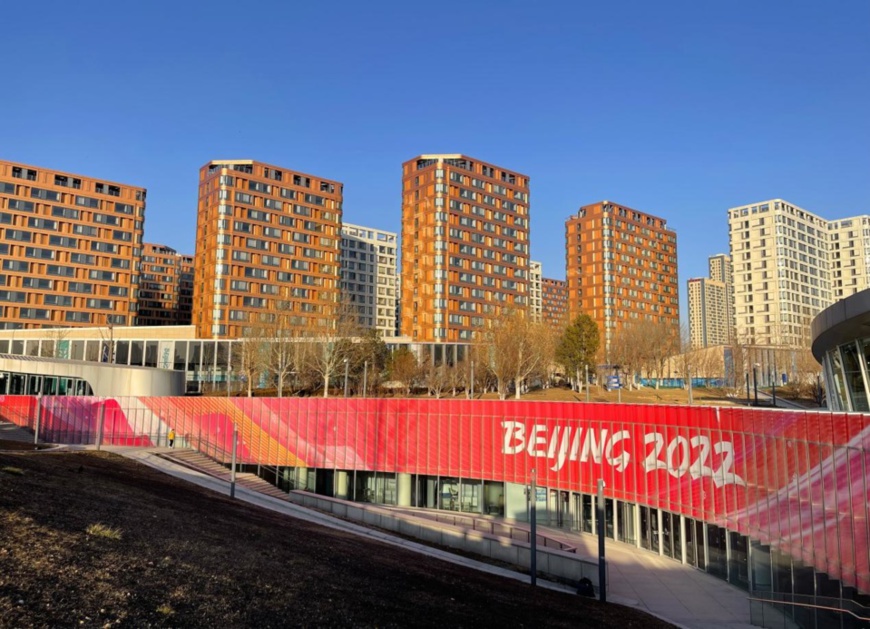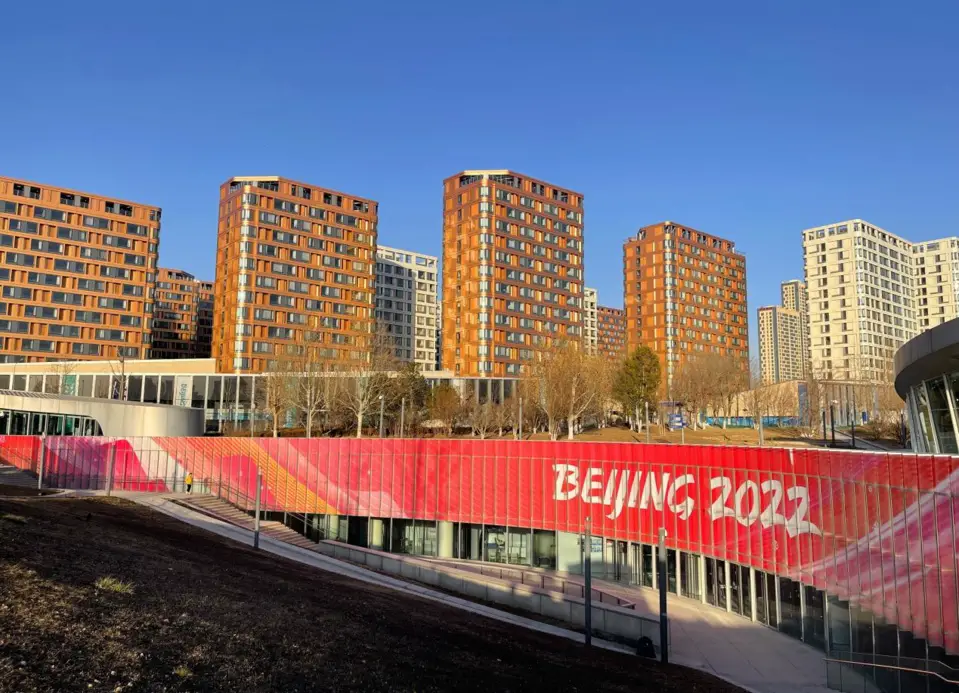By Sun Longfei, Li Yang, People’s Daily

The Beijing Olympic Village, covering about 330,000 square meters, houses 20 residential buildings. It has three functional sections - an operation area, a residential area and a commercial plaza. (Photo by Hu Qingming/People’s Daily Online)
Olympic Villages for the Beijing 2022 Olympic Winter Games in downtown Beijing, the Chinese capital's Yanqing district and Hebei province's Zhangjiakou officially opened on Jan. 27.
Over 300 athletes and team officials from some 20 countries and regions arrived at the Beijing village on the same day.
During the Winter Olympics, the complex will house nearly 1,700 athletes and team officials from 44 countries and regions.
Some teams of China's Beijing 2022 delegation have registered in the Olympic Villages and will start training for acclimatization. The ice hockey teams of the country now live in the Beijing Olympic Village, while the cross-country skiing, the moguls, snowboard parallel giant slalom, and biathlon team are in Zhangjiakou Olympic Village.
Zhang Guannan, deputy director of the liaison department for the Beijing village's operation team, introduced that the Beijing village is divided into three sections – an operation area, a residential area and a commercial plaza.
The reception center in the operation area is the first stop of athletes after they arrive at the Beijing village, where they register and then head to the residential area.
The residential area not only offers comfortable accommodation, but also houses fitness, entertainment, health care and other facilities.
Besides, the Beijing village boasts safe and diverse catering services. The menu there has been approved by the International Olympic Committee, and all the dishes on the menu rotate in a cycle of eight days.
“The Beijing Olympic Village is a home of athletes, and the largest non-competition venue of the Beijing 2022 Olympic Winter Games. It is also the venue that offers the longest services during the Winter Games,” said Zhang.
Adopting an athlete-centered approach, the Beijing village will offer 24-hour accommodation, catering, logistics services of premium quality, Zhang added.
To better facilitate the daily life of athletes and team officials, who live in a close-loop environment, the Beijing village has equipped its commercial plaza with franchise stores, banks, a post office, a hair salon and convenient stores. There is also an exhibition area displaying traditional Chinese culture, which aims to build a platform of cultural communication.
The Beijing Olympic Village has adopted a series of measures for pandemic response. For instance, all residents in the village have to go through nucleic acid test on a daily basis; signs are posted at multiple locations in the village to remind people of anti-pandemic measures; and dining halls are separated into small sections. In addition, fitness and entertainment facilities, as well as stores in the commercial plaza will all cap the number of visitors to avoid crowding.
The Yanqing village also welcomed athletes and team officials on the day it was opened. Twenty-six Chinese athletes are expected to live in the village during the Winter Games.
According to Cheng Hong, mayor of the Yanqing Olympic Village, the complex will receive nearly 1,300 athletes and team officials from 91 countries and regions during the Winter Games.
Over 300 athletes and team officials from some 20 countries and regions arrived at the Beijing village on the same day.
During the Winter Olympics, the complex will house nearly 1,700 athletes and team officials from 44 countries and regions.
Some teams of China's Beijing 2022 delegation have registered in the Olympic Villages and will start training for acclimatization. The ice hockey teams of the country now live in the Beijing Olympic Village, while the cross-country skiing, the moguls, snowboard parallel giant slalom, and biathlon team are in Zhangjiakou Olympic Village.
Zhang Guannan, deputy director of the liaison department for the Beijing village's operation team, introduced that the Beijing village is divided into three sections – an operation area, a residential area and a commercial plaza.
The reception center in the operation area is the first stop of athletes after they arrive at the Beijing village, where they register and then head to the residential area.
The residential area not only offers comfortable accommodation, but also houses fitness, entertainment, health care and other facilities.
Besides, the Beijing village boasts safe and diverse catering services. The menu there has been approved by the International Olympic Committee, and all the dishes on the menu rotate in a cycle of eight days.
“The Beijing Olympic Village is a home of athletes, and the largest non-competition venue of the Beijing 2022 Olympic Winter Games. It is also the venue that offers the longest services during the Winter Games,” said Zhang.
Adopting an athlete-centered approach, the Beijing village will offer 24-hour accommodation, catering, logistics services of premium quality, Zhang added.
To better facilitate the daily life of athletes and team officials, who live in a close-loop environment, the Beijing village has equipped its commercial plaza with franchise stores, banks, a post office, a hair salon and convenient stores. There is also an exhibition area displaying traditional Chinese culture, which aims to build a platform of cultural communication.
The Beijing Olympic Village has adopted a series of measures for pandemic response. For instance, all residents in the village have to go through nucleic acid test on a daily basis; signs are posted at multiple locations in the village to remind people of anti-pandemic measures; and dining halls are separated into small sections. In addition, fitness and entertainment facilities, as well as stores in the commercial plaza will all cap the number of visitors to avoid crowding.
The Yanqing village also welcomed athletes and team officials on the day it was opened. Twenty-six Chinese athletes are expected to live in the village during the Winter Games.
According to Cheng Hong, mayor of the Yanqing Olympic Village, the complex will receive nearly 1,300 athletes and team officials from 91 countries and regions during the Winter Games.
 Menu
Menu
 Olympic Villages for Beijing 2022 officially open doors to participants
Olympic Villages for Beijing 2022 officially open doors to participants
















